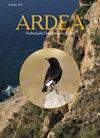顺风航行,从防波堤的角度看大冰碛
IF 1.3
4区 生物学
Q3 ORNITHOLOGY
引用次数: 0
摘要
关于数量、数量和觅食活动,这期《阿狄亚》特刊突出了一些最新的研究发现,但也反映了正在进行的辩论,即我们需要如何看待与渔业和捕鱼利益的冲突,这种冲突让我们忙碌了这么长时间。通过汇集来自欧洲各地和以色列的各种论文,我们相信,这不仅将有助于更好地了解该物种,而且有助于解决围绕这场冲突仍然存在的问题。该物种在应对环境条件变化方面的灵活性令人着迷。也许正是这种灵活性,即当条件发生变化时,Cormorants寻找出路的力量,吸引了研究人员多年的注意力,同时也让许多渔业既得利益者对这种鸟类深恶痛绝。令人感兴趣的是,在同一时期,双冠Cormorant Phalacrocorax auritus在美国和加拿大也提出了同样的问题,并受到了严格的控制措施(例如,Wires 2014)。与其因为珊瑚虫捕食鱼类而妖魔化它们,也许我们可以从它们的捕鱼方式中学到很多东西,因为它们与同一栖息地的许多人类使用者不同,从未被证明过度利用健康的自然系统。本文章由计算机程序翻译,如有差异,请以英文原文为准。
Sailing Down-Wind, a Breakwaters' Perspective on the Great Cormorant
bution, numbers and foraging activities, this special issue of Ardea highlights some of the latest research findings, but also reflects on the ongoing debate about how we need to see the perceived conflict with fisheries and angling interests that has kept us busy for so long. By bringing together this diverse collection of papers from all over Europe and Israel we are convinced that this will not only lead to a better understanding of the species but will also be of help in addressing the questions around this conflict that still remain. The species is fascinating in its flexibility to respond to changes in environmental conditions. It is perhaps that flexibility, that ever-existing power of Cormorants to find a way out when conditions change, that has attracted the attention of researchers for so many years and, at the same time, has made the birds so thoroughly hated by many who have vested interests in fisheries. Interest ingly, during the same period the Double-crested Cormorant Phalacrocorax auritus has raised the same questions in the United States and Canada and has been subject to rigorous control measures (e.g. Wires 2014). Rather than demonising Cormorants for their predation on fishes, perhaps we can learn a lot from their way of fishing, from the way that they, unlike many human users in the same habitats, have never been shown to over-exploit healthy, natural systems.
求助全文
通过发布文献求助,成功后即可免费获取论文全文。
去求助
来源期刊

Ardea
生物-鸟类学
CiteScore
2.10
自引率
0.00%
发文量
49
审稿时长
>12 weeks
期刊介绍:
Ardea is the scientific journal of the Netherlands Ornithologists'' Union, and is published since 1912. The journal welcomes manuscripts reporting significant new findings in ornithology, in particular those covering the ecology, life history, and evolution of birds, and including sound descriptive work. Ardea publishes Original research papers, Short notes and Book reviews. In addition to the regular three issues per year, Ardea publishes specials that contain conference or workshop proceedings (produced on request).
 求助内容:
求助内容: 应助结果提醒方式:
应助结果提醒方式:


